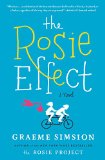Summary | Excerpt | Reading Guide | Reviews | Beyond the Book | Readalikes | Genres & Themes | Author Bio

From my perspective there was no problem: I was established as a visiting professor in the Columbia medical school and no longer needed to worry about "creating a good first impression." Nor could
I imagine being refused service in a restaurant because of the color of my shirt. Rosie's outer clothing, which was largely black, had not been affected. The problem was restricted to her underwear.
I argued that I had no objection to the new shade and that no one else should be seeing her undressed, except perhaps a doctor, whose professionalism should prevent him or her from being concerned with aesthetics. But Rosie had already tried to discuss the problem with Jerome, the neighbor whom she had identified as the offender, to prevent a recurrence. This seemed a reasonable course of action, but Jerome had told Rosie to go screw herself.
I was not surprised that she had encountered resistance. Rosie habitually took a direct approach to communication. In speaking to me, it was effective, indeed necessary, but others frequently interpreted her directness as confrontational. Jerome did not convey an impression of wanting to explore win-win solutions.
Now Rosie wanted me to "stand up to him" and demonstrate that we "wouldn't be pushed around." This was exactly the sort of behavior that I instruct my martial-arts students to avoid. If both parties have the goal of establishing dominance and hence apply the algorithm of "respond with greater force," the ultimate result will be the disablement or death of one party. Over laundry.
But the laundry situation was minor in the context of the week as a whole. Because there had been a disaster.
I am often accused of overusing that word, but any reasonable person would accept that it was an appropriate term to describe the failure of my closest friends' marriage, involving two dependent children. Gene and Claudia were in Australia, but the situation was about to cause further disruption to my schedule.
Gene and I had conversed over a Skype link, and the communication quality had been poor. Gene may also have been drunk. He seemed reluctant to divulge the details, probably because:
After promising Claudia that he would abandon his project to have sex with a woman from each country of the world, he had failed to honor his commitment. The violation had occurred at a conference in Göteborg, Sweden.
"Don, show a bit of compassion," he said. "What were the odds of her living in Melbourne? She was Icelandic."
I pointed out that I was Australian and living in the United States. Simple disproof by counterexample of Gene's ludicrous proposition that people remain in their own countries.
"Okay, but Melbourne. And knowing Claudia. What are the odds of that?"
"Difficult to calculate." I pointed out that Gene should have asked this question before adding to his tally of nationalities. If he wanted a reasonable estimate of the probability, I would need information about migration patterns and the size of Claudia's social and professional network.
There was another factor. "In calculating the risk, I need to know how many women you've seduced since you agreed not to. Obviously the risk increases proportionately."
"Does it matter?"
"If you want an estimate. I'm presuming the answer is not zero," I said.
"Don, conferences—overseas conferences—don't count. That's why people go to conferences. Everyone understands that."
"If Claudia understands, why is there a problem?"
"You're not supposed to get caught. What happens in Göteborg stays in Göteborg."
"Presumably Icelandic Woman was unaware of this rule."
An excerpt from The Rosie Effect, a novel by Graeme Simsion, reprinted with the permission of the author and Simon & Schuster. Visit www.RosieBooks.com for more information and to order your copy today.
Your guide toexceptional books
BookBrowse seeks out and recommends the best in contemporary fiction and nonfiction—books that not only engage and entertain but also deepen our understanding of ourselves and the world around us.